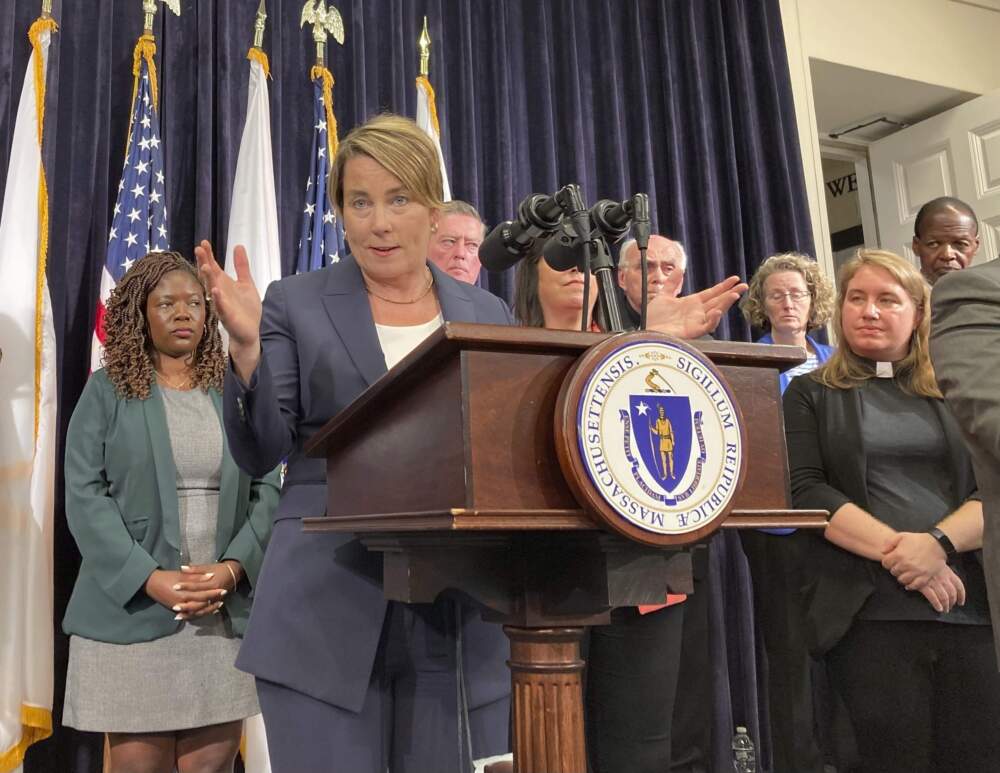Advertisement
Mass. soon will end its housing guarantee for families in state shelter system
Resume
Massachusetts will soon end its guarantee to shelter families in need, as the state's system is overwhelmed by the record number of unhoused families seeking shelter, Gov. Maura Healey announced Monday.
When the state family shelter system hits 7,500 households, Healey said the state will no longer guarantee placements — even for eligible families.
As of Monday, there are 6,945 families in the state-funded family shelter system. The state expects to hit the 7,500 cap by the end of the month. Healey said that after it hits the new limit, the state will create a waitlist and families with health and safety risks will be prioritized for housing.
"Today, we can share that our shelter system is on the verge of reaching capacity," Healey said, speaking at a press conference Monday morning. "Especially with winter approaching, we need everyone to understand that we are entering a new phase of this challenge. We can no longer guarantee shelter placement for families."
While other politicians have threatened to create a shelter waitlist, it has never happened before.
“This is definitely a major break from the state's commitment to providing immediate shelter to families with no other place to go who do meet the narrow eligibility criteria for shelter,” said Kelly Turley, associate director of the Massachusetts Coalition for the Homeless.
She said she’s “very concerned” about the families that will be placed on a waiting list. Turley hopes the state will create congregate sites for families on the waitlist to stay while awaiting a shelter placement.
Elizabeth Alfred, an attorney at Greater Boston Legal Services, said it’s easy to know what will happen to those families by looking at people deemed ineligible for shelter placements under the current system.
“They stay in places that are unheated or they stay in cars or they stay outside or they stay in abusive situations,” said Alfred. “I think we'll see more families having to stay in places that are not safe for them.”
Healey said she is appointing Lieutenant General Leon Scott Rice to direct the state's family shelter system. In a statement, she said, he will be responsible for "implementing this new phase of the emergency shelter system" and coordinating those efforts with local, state and federal officials.
Rice served in the United States Air Force and directed the Air National Guard. He also served as the adjutant general of the Massachusetts National Guard, where he led the emergency response to various natural disasters, as well as ice storms and the Boston Marathon bombing.
“It is important to me that our state succeeds in meeting this humanitarian challenge,” said Rice at the press conference. “I'll bring all my values and all I've learned to bear on this crisis.”
The state’s family shelter system dates back to a 1983 law which obligates the state to provide shelter for all eligible families. The caseload has varied over the years, but this year, the state has seen record-breaking growth in its family shelter population.
One of the driving factors has been the number of migrant families arriving in Massachusetts in need of housing. Many of these families are originally from Haiti but have spent years traveling through South America, often stopping elsewhere in the U.S. before coming to the commonwealth.
“This is a federal problem that demands a federal solution,” said Healey. “Families are coming in through the federal system, and the federal government must step up to support them.”
In August, Healey declared a state of emergency over the situation. The state has run out of traditional shelter units and about 3,200 of the families currently in the shelter system reside in overflow hotels and motels rented by the state, with more than 1,000 households in unstaffed motels and hotels aided by National Guard members.
Healey also announced her administration has asked the federal government to set up larger sites to shelter families. She added Massachusetts also will expand its effort to find people in the system jobs so they can move out of the shelter system and into more permanent housing. The average length of state in the system is over a year.
"The federal government must meet its emergency management responsibilities directly. It will need to establish larger sites where more families can be sheltered and provided with basic necessities," she said. "This is something that has been done before in similar moments, and it must be done again."
This article was originally published on October 16, 2023.
This segment aired on October 16, 2023.
